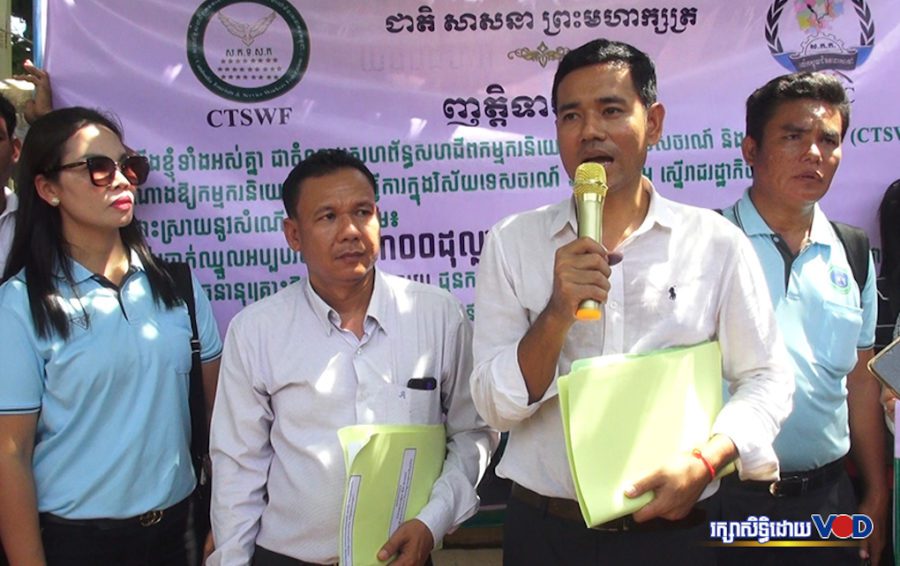Tourism, agriculture and service sector workers on Monday urged the government to establish a monthly minimum wage of $300 for their industries, demanding a base salary like the one currently only enjoyed by the nation’s garment workers.
About 150 workers and union representatives gathered in front of the Labor Ministry’s headquarters in Phnom Penh to submit a petition, calling for the minimum wage and improved working conditions, as well as demanding hotels and other establishments fairly pay out tips collected in the form of mandatory service charges, as mandated by the Labor Law.
Cambodia’s multimillion-dollar garment and footwear sector is the only industry with an established minimum wage, currently set at $182 a month, up from $100 in 2014.
Mam Rithy, president of the Cambodian Tourism and Services Workers Federation, told reporters in front of the Labor Ministry that tourism and service workers received base wages of $80 to $130 a month — rates which were determined by employers.
“It seriously affects the workers,” Rithy said. “Partly, we have seen that some owners are exploiting workers by deciding a base wage for workers at will.”
“There is no clear standard that allows them to live properly and with dignity,” Rithy added.
Pet Sambo, a Siem Reap hotel worker, said his employer offers a base wage of $80 to $120, which makes it difficult for workers to support their families.
“The biggest problem is the daily living expenses. It is really tough,” Sambo said. “It involves the cost of children’s schooling, eating, renting a home and utilities, and $120 is so little for us.”
Heng Choeun, president of the Cambodian Agricultural Workers Federation, said workers in the agricultural sector were being exploited by their companies, employed under short-term contracts, threatened by employers, and working without set work hours, for low wages and without social benefits as required by law.
Choeun demanded that the government urge employers to follow the law, and asked the Labor Ministry to examine working conditions in the agricultural sector.
“The workers in this sector are working with challenges. They work in [remote fields]. There is no organization or anyone to protect them. Their employers use them as they see fit,” Choeun said.
“When they create a union, they are fired or threatened until they stop their union activity,” Choeun added.
After union representatives spoke publicly, Labor Ministry officials allowed about 10 workers’ representatives to meet with ministry officials.
Labor Ministry spokesman Heng Sour told VOD in a Telegram message that the ministry had received the workers’ request and would share it with relevant stakeholders in government, unions and the private sector for further discussion and deliberation.
Ath Thorn, president of the Cambodian Labor Confederation (CLC), supported the workers’ demands and said he wanted to see a minimum wage for workers in the tourism, agriculture and service sectors set in a similar fashion to the garment and footwear industry.
Thorn also asked the government to review labor contract regulations and to revoke a Labor Ministry notice issued in May that he said has resulted in employers using short-term contracts more frequently.
“With reference to Notice 050, employers will use short-term contracts forever. Workers are not safe in their jobs, and have no rights and no good working conditions,” Thorn said.
The notice states that fixed duration contracts may be used for up to four years, including renewals, before they automatically become an unspecified duration contract.
Union representatives said more than 600,000 workers were employed in the tourism and service sectors, while the number of agricultural workers was not known.
In May, unions and civil society groups marking International Labor Day petitioned the government for the establishment of a minimum wage for workers in the domestic, tourism, construction and forestry sectors.
(Translated and edited from the original article on VOD Khmer)













